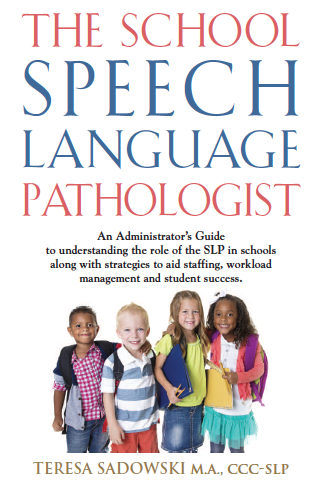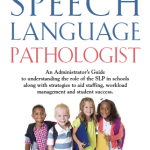My Book “The School SLP”
It’s here!!!
THE SCHOOL SPEECH LANGUAGE PATHOLOGIST is now for sale at all storefronts as an e-book for $4.99:
AMAZON:
http://www.amazon.com/dp/B00Y6YDAZI
BARNES & NOBLE:
http://www.barnesandnoble.com/w/the-school-speech-language-pathologist-teresa-sadowski/1121994087?ean=2940151592819&itm=1&usri=2940151592819
BOOKLOCKER:
http://booklocker.com/books/8038.html
ITUNES:
https://itunes.apple.com/us/book/school-speech-language-pathologist/id998181107
KOBO:
https://store.kobobooks.com/en-US/ebook/the-school-language-pathologist
Chronic Otitis Media and Risk of Reading Failure
This article was originally published in “Your Middle Schooler: A Unique Age” in 2008. I try to include information on hearing history in every evaluation I perform. Not just for curiosity but because I really feel early hearing history plays a significant roll in language development and “learning to listen”. Last time I asked audiologists were not supporting this correlation. I hope things have changed. Because it is not a big issue in audiology, I have a hard time getting most administrators to accept this as an issue. As long as the kids pass the school screening, life is good. If universal supports were put in place around hearing and acoustics in general imaging the problems that could be avoided.
WEDNESDAY, JANUARY 16, 2008
Chronic Otitis Media and Risk of Reading Failure
While this paper does not specifically pertain to Middle School Students, I would have to guess that approximately 60-70% of my middle school caseload, at any specific time, have a history of Chronic Otitis Media also known as ear infections. Many of these students also have associated reading difficulties or history of reading difficulties.
.
Chronic Otitis Media and Risk of Reading Failure
by Teresa Sadowski MA/SLP-ccc
May 2007
Having worked as a Speech Language Pathologist for over 20 years, it always amazes me the number of students on my caseloads, that have a history of chronic otitis media or a history of excessive fluid in the middle ear. Perhaps it is not that that unusual. Statistics show that 70% of children will have at least one bout of otitis media commonly known as an ear infection before the age of 3. For many children ear infections are a recurring problem. It would not matter what level I was working with. I can state with some certainty that at least 50% of my public school caseload at any given time had a significant history of fluctuating hearing loss early on due to fluid in the middle ear because of chronic ear infections or chronic allergies. Let me make some generalizations about these kids. During my preschool experience, the students usually presented with articulation difficulties, had trouble with rhyming, had trouble remembering the right words to songs and many of them always seemed one step behind when responding verbally. Preschoolers may still be dealing with occasional ear infections, effecting hearing acuity and requiring treatment. During my kindergarten through 5th grade experience, the underlying language issues demonstrated by these students developed into actual reading problems. Simple articulation errors usually resolved but difficulty with phonics emerge. These students usually receive additional support services, specific reading instruction and tutoring. Often even with specific reading instruction, these kids were slow to have any kind of success with reading. During grade school, hearing usually stabilizes but it is not unusual for these students to still suffer with an occasional ear infection or fluid filled ears (especially during allergy season). In middle school my students continue to struggle with reading, they can usually decode consonants but vowels might be a problem. Difficulties with reading comprehension become very obvious. Most also demonstrate poor fluency when they read. These students have not naturally acquired the higher level language skills such as understanding ambiguous and figurative language. Their overall vocabulary is weak. These are the kids who miss the nuances and subtleties in language, they don’t get the jokes and they are not very flexible with their own use of language.
So what is the common thread that keeps kids with chronic ear infections or chronic allergies from becoming proficient readers? The answer could be very simple. Both groups experience fluctuating hearing loss early on. Ear infections occur through out childhood but the incidence of ear infections actually peaks between 6 and 12 months of age. When a child has fluid in his middle ear sounds can become seriously muffled, high frequency sounds cannot be heard. As a result, kids might miss a lot of what is said to them or miss a lot of environmental sounds that convey meaning. When hearing is effected, sounds, words and sentences are easily missed and/or misunderstood. A baby or young child obviously can’t tell you what they are missing. They can’t ask you to repeat yourself. They can’t tell you they can’t hear you because background noise is too loud. Their hearing can fluctuate so much that we cannot figure out what they are missing or when. Children learn language through direct contact with others and through imitation. If their hearing is distorted, imagine how they might perceive individual sounds both speech and environmental. I have always felt that these babies and kids miss critical information or do not develop critical listening skills that in some way effects the development of language and later on development of reading/spelling/writing skills. Basically, they may have missed critical developmental periods where they are learning to listen to, learn about and discriminate phonemes or individual speech sound.
It is surprising that so little research has been done around the very common correlation between fluctuating hearing loss and difficulties acquiring reading skills. One very interesting study, completed by Dr. Heather Winskel, from the University of Western Sydney, Australia, found that if a child experiences a middle ear infection during the crucial first years of life, it may have long-term effects on subsequent language and literacy development. In her study, she compared two groups of 43 children between the ages of 6 and 8. One group had an early history of repeated episodes of otitis media and the control group was matched for age, gender and socio-economic status. Children were tested on three different linguistic levels – phonological awareness, semantic knowledge and narration and reading ability. The children with a history of ear infections tended to achieve lower scores on phonological awareness skills of alliteration, rhyme and non-word reading, semantic skills of expressive vocabulary and word definitions and reading compared to non-otitis media children. Research agrees strongly that phonological awareness or phonemic awareness is a necessary skill that children need to begin reading. Could poor development of phonemic awareness be the key factor why children with a history of fluctuating hearing have difficulty learning to read naturally, using traditional methods?
So what is phonological or phonemic awareness? Scholars differ on what exactly to call it, but it is the same thing, here we will use the term phonemic awareness. Phonemic awareness is the ability to identify individual sounds and their order within words, underlies self-correction in word attack, word recognition and spelling: the ability to go from whole to the parts (Lindamood and Lindamood 1998). Phonemic awareness is not only correlated with learning to read, but research indicates a stronger statement is true: phonological awareness appears to play a causal role in reading acquisition. Phonological awareness is a foundational ability underlying the learning of spelling-sound correspondences (Stanovich, 1993-94). Basically, phonological or phonemic awareness is the ability to identify the sounds in words, not the letters but the sounds. For most of us, we acquired this skill so naturally we did not know we were doing it or we have practiced this skill for so many years it is second nature. Phonemic awareness develops long before our ability to put sounds and letters together. Adams in 1990 described 5 levels of honemic awareness in terms of abilities:
to hear rhymes and alliteration as measured by knowledge of nursery rhymes
to do oddity tasks (comparing and contrasting the sounds of words for rhyme and alliteration)
to blend and split syllables
to perform phonemic segmentation (such as counting out the number of phonemes in a word)
to perform phoneme manipulation tasks (such as adding, deleting a particular phoneme and regenerating a word from the remainder).
Scholars will also differ slightly on the levels of phonemic awareness or use different words to describe each level but they all pretty much agree that rhyming is when children show initial phonemic awareness. As a speech language pathologist, I would have to differ saying phonemic awareness begins much earlier. I believe phonemic awareness begins when the child begins to recognize and acquire sounds in their native language. However, when any of the 5 levels of phonemic awareness mentioned above are not achieved, reading difficulties are sure to develop. In some students, this can be so obvious that specific testing is just to confirm what the specialist already knows.
One reason why educators are so interested in phonemic awareness is that research indicates that it is the best predictor of the ease of early reading acquisition (Stanovich, 1993-94), better even than IQ, vocabulary and listening comprehension. This is a very interesting statement and echoed often in various research. What can be done to aid reading acquisition in children with fluctuating hearing loss? First of all children who suffer with chronic ear infections and chronic seasonal allergies should be considered at risk for reading failure and monitored closely. Parents should consult with early intervention or local public preschool to make sure developmental milestones are reached at the proper time. Public Schools also recommend and provide assessment in all learning and language areas. A full hearing evaluation by a licensed audiologist is essential. However, be aware a one time hearing evaluation can not predict how hearing may fluctuate or what the child is missing at any specific time. While a pediatrician will treat a child during an ear infection, if a child has chronic ear infections or fluid filled ears it is in the child’s best interest to consult a specialist. An Otolaryngologist (ear nose and throat doctor) along with the audiologist can determine how much fluid is in the ears, keeping the ear drum from moving efficiently. Depending on the situation, the Otolaryngologist may recommend the insertion of Pressure Equalization tubes through the ear drum. It is a very common procedure to help keep the middle ear fluid free. Without fluid in the middle hearing should return and remain consistent. When an early intervention or preschool child is identified as having difficulty developing speech and language, direct services are often recommended. A good therapist will present a variety of activities that “play with sounds and language” encouraging awareness and development of sounds and language while also focusing on specific needs. The speech therapist is often the first person to recognize that a child is at risk for reading difficulties.
Unfortunately, most reading difficulties are not identified and addressed until the student fails, usually the second half of first grade. Typical students easily acquire phonemic skills often without being specifically taught. They are ready to learn to read anywhere between 5 and 7 years of age. There are other developmental factors that determine whether a child is ready to learn reading so time might be given to see if a student can “catch up on their own”. This might be a good rule some of the time. However, if a student has a history of fluctuating hearing loss and has not developed phonemic awareness, reading is not going to emerge on its own. I do not have a lot of experience with reading programs but I have noticed that traditional reading programs do not always work for children who have deficits with phonemic awareness. These children do better with programs that use a multi-sensory approach and begin with a phonemic awareness component. The Lindamood Phoneme Sequencing Program (LIPS), uses a very strong multi-sensory phonemic awareness model. LIPS not only teaches the children to listen for the individual sounds it teaches the students how to feel the sounds and what the sounds look like. As the program, progresses the children are taught how to blend and break apart real and nonsense words. Teachers and specialists who are trained in this program and feel comfortable using it report wonderful successes for their students. My own child who has a history of fluctuating hearing did very well with a reading program called Project Read. I am less familiar with this program but remember it had a multi-sensory component that cued for sound and syllable production. Our local grade school uses Project Read with good results.
How does a parent know their child is developing appropriate phonemic awareness? There some very simple skills things to look for.
Awareness of Rhyming Words (age 3-4)Can your child….identify words that rhyme. For example, “Put your thumbs up if these two words rhyme, pail-tail or cow-pig?” or “Finish this rhyme, Red bed, blue ____.”
Awareness of Syllables (age 4-5)Can your child…..identify that words are made up of syllables. For example, “Can you clap and count the syllables or the word parts in rainbow?”
Awareness of Onsets and Rhymes-Sound Substitution (age 6)Can your child….identify onsets and rhymes in words. For example, “What rhymes with /at/ and begins with /f/?”
Sound Isolation – Awareness of Beginning, Middle and Ending Sounds (age 6)Can your child….Identify beginning, middle, and ending sounds in words. For example, “What is the beginning sound in neck?” “What is the ending sound in jog? “What sound do you hear in the middle of kitten?”
Phonemic Blending (age 6)Can your child….blend phonemes heard auditorily into a word. For example, after hearing /c/ /a/ /t/ said in a stretched pronunciation, the child says cat.
Phoneme Segmentation (age 6-7)Can your child….count the sounds in a word (age 6). For example, “How many sounds do you hear in the word dog?”Is able to identify the sounds heard in a word. For example, “What sounds do you hear in the word man?”
Phoneme Manipulation (Age 7+)Can your child omit or substitute phonemes to make new words. For example, “What word would we have if we changed the /t/ in Tommy to an /m/?” (mommy) or “What word would we have if we left out the /t/ in the middle of stand?” (sand)
Parents can provide their child with the ultimate “phonological” experience. If hearing loss of any kind is suspected, make sure parents know to have the child’s attention and look directly at the child when they speak. Provide children with lots of opportunities to listen and respond. This may sound simple but reading, learning, memorizing and reciting nursery rhymes and singing songs are excellent for developing phonemic awareness. Reading to children is also key to developing phonemic awareness. Keep background noise to a minimum. Do not keep the radio or TV on all the time. Parents should not be afraid to express their concerns to their pediatrician. Most pediatricians are not aware of the implications fluctuating hearing loss has in learning to read. Parents should seek out services through early intervention or your local public schools. Both agencies are required to screen and/or test students to determine if a disability exists.
Phonemic awareness is one of the first steps to success in reading. When a child has not developed efficient phonemic awareness because of fluctuating hearing early on, the risk of reading failure is very real. With the right intervention, involving multi-sensory tasks that focus on improving the child’s awareness of individual sounds and how they work together, these children have a better chance of becoming proficient readers.
Referances
Adams, Marilyn Jager (1990). Beginning to Read: Thinking and Learning about Print. Cambridge, MA: Bolt, Beranek, and Newman, Inc. ED 317 950
Lindamood, Patricia and Lindamood, Phyllis (1998). The Lindamood Phoneme Sequencing Program Teachers Manual. Austin TX. Pro-ed.
Sensenbaugh, Roger Phonemic Awareness: An Important Early Step in Learning To Read. THE EDUCATIONAL RESOURCES INFORMATION CENTER (ERIC). http://www.kidsource.com/kidsource/content2/phoemic.p.k12.4.html#contents
Stanovich, Keith E. (1993-94). “Romance and Reality (Distinguished Educator Series).” Reading Teacher, 47(4), 280-91. EJ 477 302
Winskel, Dr. Heather. Study reveals recurrent middle ear infections can have a major impact on children’s development. Research Australia. Feb 2007. http://www.eurekalert.org/pub_releases/2007-02/ra-srr020407.php
Los Angeles County Office of Education Website. Teams Educational Resources. Levels of Phonemic Awareness. http://teams.lacoe.edu/documentation/classrooms/patti/k-1/teacher/assessment/levels.html
Tell Me More About AAPPSPA
What an acronym. After reading in forums I found out what this means American Academy of Private Practice in Speech Pathology and Audiology. Their site looks professional and the group seems to have a lot to offer. Does anyone out there belong? Is this an organization worth joining? Reasonable rates.
Teresa
I received this response to my question when I posed it on ASHA forums….Thanks Denise
ASHA CE Administrator for AAPPSPA
Out of Range Testing for Severely Involved Students
Paula Stone,M.S.,C.C.C.-SLP wrote:
I would like to spend time discussing evaluation procedures for children who are severe to profound but chronologically are beyond the PLS 5.
Thank you for considering this important discussion.
Evaluating severely involved children who are below age ranges for test measures is extremely difficult. Being in the public schools we do run across this every so often. I can only tell you what I do. I’m not familiar with the Preschool Language Scale 5 but I do remember how the old PLS worked. I think you should be able to apply some of the information below. If there is anyone else out there who works in a setting where most of the kids are severe to profound in their development please add in your information. Especially if there are language scales out there that work well with severely language impaired children.
My experience is primarily with low functioning, low IQ kids. However, I found one past evaluation where I had to be very creative. School systems are often very limited with their variety of testing materials.
- In general, these evaluations will end up being very narrative. You will have to constantly watch the student’s behavior and manner of performance. You will have to comment on almost everything.
- You will not be able to report standard scores. If a test has age scores I will reluctantly report those. However, I will explain why standard scores can not be presented
- If the student is able to attend and point, I like to start with the Peabody Picture Vocabulary Test (PPVT) and (EVT). I actually like all my students to have a PPVT and an EVT. I think these tests combined with manner of performance gives a lot of information. Plus there is a huge age range, making it easy to compare performance from year to year or every three years.
- You can use tests like the PLS or the Test of Auditory Comprehension of Language (TACL) as checklists, describing what the kids can and cannot do. I’ve actually taken those tests and used the tasks mentioned to make a checklist to monitor performance. It isn’t ideal, might even be wrong to do this but it works and you have something to measure.
- A Language Sample works very well. You can determine Mean Length of Utterance, sentence structure, omissions, intent, topic maintenance and a whole host of other things. You’re going to have to use your tape recorder (now iphone) and transcribe the language sample then comment. Honestly this is where your clinical skills are put to the test.
- If your student is non-verbal you will have to describe how the child responds to language stimuli. If they work with a communication board try to incorporate that method.
- You may want to include an observation or how discuss how the student works in therapy.
- Evaluation might have to take place over several shorter sessions.
- Adding in some sort of pragmatic profile scale is also a good idea. With our low kids we are always teaching social skills. With younger kids the Clinical Evaluation Language Functions (CELF) probably isn’t the best choice. I am sure there are others out there.
- Every single one of these evaluations are going to look different.
This might not be the best way to evaluate severely involved kids but I work with what I have. Most school systems will just be happy that they don’t have to hire out for a speech and language evaluation. If they insist on standards explain the situation to them. They have two options hire out or buy the right testing materials. I’ve read outside evaluations on severely involved kids, from both hospitals and private vendors and I’ve yet to see an evaluation that is significantly better than what I generate. It’s challenging that’s for sure and it takes a lot more work. I’d love to hear what you have to say on the subject.
Below are two sample evaluations, hope they help out.
Teresa
Pressure vs Expectations
This was originally posted in “Your Middle Schooler: A Unique Age” in October 2008. This information actually ties in with the message in the movie “The Road to Nowhere”
I am saying earlier experiences have changed but child development has not evolved any differently. So right from the start we put too much pressure on them. I am not convinced that full day kindergarten makes your kid smarter or helps them to read that much earlier. By the way, most kid’s skills tend to catch up with each other by about 4th grade. So even if little Sally’s parents bragged about her reading at 4 she will probably turn out to be just an average student. Her experiences were different, exposed to pre-reading skills earlier and it worked for her. Perhaps, she was even pressured into reading so her parents could brag. I believe a lot of the pressure (but not all) emerges when children are expected to do things they are not developmentally ready to do.
So with pressure to succeed and to fit in especially at the middle school and high school level identified as a problem, the trend has been to decrease the pressure and to get help for kids if needed. Most parents have become aware of creating too much pressure and I think have backed off. However, in the quest to decrease the pressure many parents and teachers have also decreased or eliminated common sense expectations.
So what is the difference between putting on too much pressure on a child and having expectations especially high ones. Pressure, I feel, is pointing your child toward an almost impossible goal. Talking about that goal 27/7 and having their life revolve around that goal. The goal becomes so much of a focus that the kid ends up hating the goal and only does it to please their parents. Kids will also self induce pressure so a parent must keep a close watch on high achievers and intervene when the pressure looks like it’s too much.
Expectations are the day to day rules and the life goals kids are suppose to follow whether a parent or teacher is reminding them or not. At home some expectations might be certain chores, doing homework without being told, going to bed at the proper time, preparing your self for school or other activities, doing your best at school, being kind to others, not bullying, speaking politely to adults, following the rules at school and other activities, telling parents important information, behaving yourself in public especially when unsupervised……the list of common sense expectations go on an on. Some of the expectations at school include being respectful to others, listening to adults, coming prepared to class, not throwing trash on the floor, following school routines without always having to be told to get moving, doing your work, working cooperatively, controlling anger, no bullying…..again the list is endless.
As my own children have gotten older, our expectations have changed and increased. We expect them to perform to the best of their ability at school. We expect them to put effort into extracurricular activities, volunteer activities and work. Our biggest expectation is that they will not drink especially if they are driving our car. Does that assure me they won’t? Of course not. But, they also know we do everything in our power to make sure that does not happen. They know we call parents to see if anyone is going to be home and we check their breath when they come in. They know there will be consequences at home for inappropriate behavior. They’ve missed a lot of parties because of our actions and I might add missed the near-death experience of a friend from too much alcohol.
I worked with a middle school teacher once, Mary we’ll call her. Mary called me naive to think my own middle school kids were not exposed to sex, drugs and alcohol. Mary implied that my kids probably were experimenting with all three. It is not that I don’t know those thing are out there but my expectations to my own children is that we do not want you around that kind of stuff or indulging in it. Needless to say, while Mary was spouting this to me, I knew that she had a couple of very wild teenage daughters at home. I assume she thought that because her girls indulged that that had to be the norm. See she was willing to accept their behavior as normal teenage behavior rather than tell them her expectations for behavior.
Kids with no expectations flounder, both at school and in their social lives. They tend to also grow up with an inappropriate sense of entitlement…. The ”I don’t have to do that” attitude. They goof around in school and disrupt things for others. Most of them know that their parents will not do anything if the teacher calls home. Parents seem to be too busy sticking up for their child’s bad behavior rather than giving them clear expectations for conduct. Some parents clearly do not care and I have to wonder about that. I see so many kids without clear life expectations and wonder what they will be doing in 10 years.
Teachers can provide clear expectations at school. However, if the parental expectations and follow up is not there it is almost impossible for the child to succeed to their potential. It is the rare student that can see school as their ticket to success and that can generate self expectations.
So parents, talk to your child. Let them know your expectations for them at home, at school and out in public . Be the parent you need to be and don’t let them run the house or make up the rules. Point out inappropriate behavior even if it is just little etiquette things. If there is a problem don’t make excuses for them, follow up with appropriate consequences. Basic expectations are life long lessons that will serve them well long after they leave the classroom.
Curriculum and Speech Therapy
I was recently asked by a new therapist, working at the middle school level, if I was able to use curriculum material in therapy. Over the years I found that it was very difficult to incorporate curriculum into therapy. So I guess my answer is no but with some clarifications and of course exceptions.
*Even though many would disagree with me, the speech pathologist is not there to teach academics. We are there to fill gaps. The SLP needs to focus on teaching underlying skills that aid independent learning and life skills. It is difficult to work on remediating language disabilities if we also have to address academics.
Last thoughts……It is important to have an idea of the basic curriculum. If a student asks for help with academics, try to drop everything, find out what they need and help them out. I know that if a student comes to me with an academic questions they are either struggling, confused or overwhelmed.
Universal Supports II
I recently wrote a post on Universal Supports geared toward administrators. I’ve worked in schools both with and without Universal Supports and I can tell you that those with Universal Supports run much smoother, fewer children have organizational difficulties and classrooms seem more manageable. I want to know what kind of Universal Supports you school or district are using?
In the school I currently work in they have a simple behavioral plan with levels. If the child reaches the bottom level the consequences are clear. Not only do they spend time in the office doing independent work, there is detention involved and the possible loss of the fun weekly activity. The students are clear on the school behavioral expectations. Because of this, our principal can keep the attention and behavior of the whole school with very little effort or need for extra discipline. I actually chuckled a little at the beginning of the year. The young administrators thought they had discovered something new and exciting. Honestly it reminded me of the rules and expectations of Catholic School. Looking back and knowing what I know now rules and expectations for both behavior and academics are necessary. The Nuns must have known something we didn’t know. Maybe some of the old ways are just better.
- All ‘keeper’ papers 3-hole punched before being distributed to kids
- Agendas posted with learning goals
- Team-wide homework posted in every classroom
- Visual supports for all key verbally presented concepts
- Consistent use of summarizers at the end of class
- Articulated (and posted) expectations for different settings that are clear and observable (behavior for cafeteria, hallways, recess, classroom)
- Team-wide blogs that list homework, week-by-week learning goals and a brief description of delivery of instruction so specialists can come in and have a clue what’s going on (this idea was suggested by a teacher)
- Routines for completing agenda at the end of every class that may include peer support (exchange with a partner to make sure it’s readable and complete)
- Collection of needed materials for homework that night done class-by-class (maybe kids carry a tote bag only for needed homework materials)
- Team-wide routines for homework collection closely monitored (same in every class)
- Regular study skills lessons before major tests done during flex modeled by teachers (use of flashcards, how to create a study guide, etc)
-
Get one, give one community service program. Students and teachers make note of needs among the team, such as students who need extra support with organization, kids who need lunch friends, etc.. The ‘jobs’ are posted, and volunteers sign up. Kids get ‘community service’ points for helping out and doing a good job. There can be training for students to deliver certain kinds of jobs, too.
Now as a Speech Language Pathologist I would like to see Universal Supports around vocabulary development. Perhaps everyone introducing new curriculum vocabulary by using roughly the same format, such as vocabulary card the kids create (always providing a knowledge connection). I think having similar classroom procedures for morning and afternoon routines. There should be some type of activity that involves playing with language (jokes, riddles, funny stories, rephrasing sentences are a few examples). Using Universal Supports also makes it easier for consulting staff. We can go in and know the discipline rules and basically how the classroom functions.
Let me know what your school does or what you think would be a good Universal Support.
Universal Supports
Does your school or district require Universal Supports? If not you should consider putting some in place. You can tell the difference between a building that has Universal Supports and one that doesn’t just by walking down the hall. Most Universal Supports are around behavior expectations, consequences and task completion. Universal supports can also be generated around vocabulary development, general classroom procedures, announcements, group listening expectations and just about anything else that can be routine.
We tell parents to be consistent with rules and consequences so why shouldn’t we take our own advice. I’ve worked in schools with and without Universal Supports especially around behavior expectations and consequences, it makes a big difference. It is also nice to walk in to a classroom and know the behavior policy and expectations.
Does your school have any unique Universal Supports that you would like to share? Has putting Universal Supports in place change the vibe in your building or school?
Teresa
Lindamood Bell for Dyspraxia?
Hello,
Has anyone else used Lindamood Bell Lips for Dyspraxia. If so how exactly did you use it? I have some good ideas but if I don’t have to reinvent the wheel that would be great, I’m starting with the voiced and voiceless sounds.
Thanks
Teresa
Being Proactive is Key
I happen to come across this article called “Special Ed Strategies: Be Clear, Be Proactive, Be Inventive” http://www.scholastic.com/browse/article.jsp?id=3756442 I was actually quite impressed. I have to say I am lucky enough to work in a school that follows most if not all of the proactive steps outlined. In the past 25 years, I know systems that work better are the ones that are flexible enough to be proactive, see it from the parents perspective and have the administration support.
If I knew that an extra half hour of speech and language services was going to help a parent feel empowered and more comfortable with the service delivery, I offered it. Once I worked with a very skilled program manager who had no problem holding marathon IEP meetings. This made the parent feel like the team cared about their child, was listening to their concerns and taking those concerns seriously. Rushing meetings or squeezing them into a half hour or hour just feels wrong.
There are a few other things that would bother me as a parent that I’ve seen happen in meetings that are not proactive. I don’t see classroom teachers taking notes when specialists are presenting their opinion or findings. Team members often play musical chairs during meetings. They leave and don’t come back or send someone in their place. So they only get half the information. Advice….. be proactive and hire a sub. I saw one administrator pull out their blackberry during a meeting, hope someone let this new administrator know it wasn’t a typical board meeting.
Being proactive is also a good rule for regular education too. A good behavioral plan that is consistent can solve a lot of problems. Creating and initiating universal supports will only strengthen your curriculum and hopefully save time. Schools need to preach high expectations and follow through.
I’ve worked in schools that take proactive measures and schools that didn’t. The schools that didn’t are always trying out new programs and new systems as a knee jerk reaction. Schools like this rarely accomplish anything. With some proactive measures in place it will be amazing how well your school can run.
Teresa Sadowski
Originally Published at Your Middle Schooler: A Unique Age by Teresa Sadowski November 2011
When does a Middle School Child need a Speech and Language Evaluation
By law every child who receives special education services has to have a Core Evaluation every three years. Depending on the child’s current needs and services it is not unusual for psychological testing or IQ testing be eliminated from that years test battery. We don’t always expect big changes with IQ over time. However, Speech and Language testing should be included in every three year reevaluation where the student currently receives therapy. During the middle school years the hope is that language will develop in leaps and bounds, even in children with language disabilities,. Think of how much a child grows and matures during the middle school years. Changes in a child’s language understanding and usage should be equally as dramatic. The middle school student should be developing higher order language skills that are important life skills. It happens naturally in children without disabilities but may not happen in children who have a language disability or history of a language disability.
It is somewhat rare that a middle school age student with no history of language or learning disabilities will suddenly need a speech and language evaluation. However, there is a huge bump in expectations for both academics and language in 7th grade. This is usually when issues may arise. Children who were discharged from speech and language services in grade school will often come across the speech language pathologist’s desk again in 7th grade.
If you’re concerned about your child, perhaps they are unable to maintain their grades, seem stressed out over school, can’t seem to grasp new concepts, unable to reason with adults and peers, behavioral issues are emerging or you just have a feeling something isn’t right, go and talk to their teacher immediately. Do not wait for things to get worse, do not assume they will get better.
Your next steps will depend on the teacher’s reaction, did they make time for you, did they take your concerns seriously, did they offer solutions or strategies to implement in the classroom, did they say they would bring your concerns to the student support team (or whatever it is called at your school, this is the first step in the Response to Intervention or RTI process). If you’re not happy with the results of that meeting or you don’t see positive changes over a 3-6 week period bring your concerns to the Principal. Also during that 3-6 week period you can ask for the speech language pathologist, learning specialist or school psychologist to observe your child in the classroom as part of the RTI process and have them make specific recommendations. Observation alone can often point remediation in the right direction by either giving suggestions for classroom accommodations or moving the evaluation process along quickly because of specific concerns. Make sure too much time doesn’t pass and establish communication with the teacher or school. You might have to initiate contact and follow up. It’s also your responsibility to communicate with your child and find out how they are feeling about all this.
It is always good to go through proper channels and start with the least restrictive interventions. However, under the law you can request an evaluation at any time. Districts might have a different way to initiate an evaluation but usually a letter to the Special Education Director expressing your concerns will get the process started.
At the middle school level a Speech and Language Evaluation is usually just a part of a core evaluation, perhaps along with academic or psychological testing. Areas of assessment depend on a child’s specific needs. Below is a list of guidelines that will help you determine if your middle school child may need a speech and language evaluation.
- When there is an earlier history of speech and language issues and student received services in the past.
- Early or chronic history of ear infections
- Difficulty with overall comprehension
- Difficulty with higher level vocabulary
- Difficulty generating ideas or organizing language
- Not being able to respond quickly to questions
- Frequently misunderstanding directions
- Significant reading difficulties involving comprehension and decoding
- Difficulty with reasoning or understanding another’s perspective
- Difficulty understanding new concepts presented within the classroom setting
- Behavioral issues, especially not getting along with peers
- Not understanding kid type jokes and humor
Many of the concerns listed above focus on higher order language development. In most children it develops so naturally that we rarely even notice. It’s only when kids get a little older that the lack of these skills become noticeable in both academic and social settings. It’s important to be as proactive during the middle school years as you would have been during the preschool years if your child wasn’t learning to speak.
Teresa Sadowski MA/SLP-ccc
January 2012













